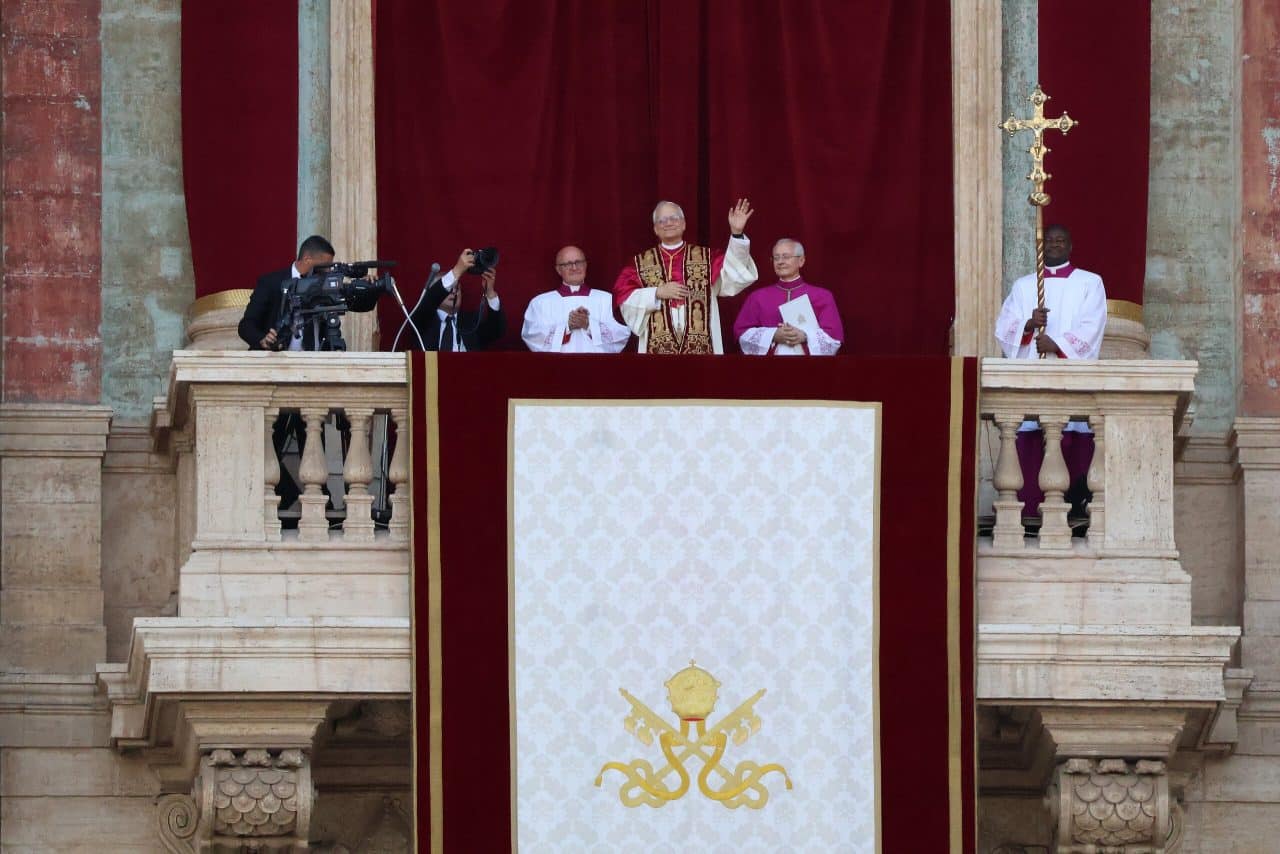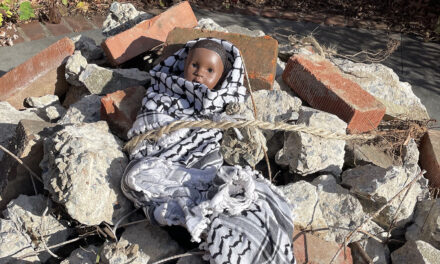Pope Leo XIV on the loggia after his election, May 8, 2025. (Photo: Edgar Beltrán / The Pillar / Wikimedia)
We have all witnessed close to two years of Israel’s genocide in Gaza but heads of the church—its spiritual leaders, its bishops, its pastors—have yet to take meaningful action on Gaza.
I’m talking about a clear strategy of nonviolence: speaking courageously from the pulpit, creating up-to-date educational resources, taking to the streets, visiting en masse the town halls and offices of elected leaders, boycotting, divesting, and even civil disobedience.
Responses to last week’s bombing of the Holy Family [Catholic] Church in Gaza —when three people were killed and many others were wounded—are an example of the church’s failure to speak and act prophetically.
Pope Leo’s response was a disappointment to Palestinian Christians. In his statement, he spoke of the bombing as a “military attack.” There was no effort to put the incident in the context of Israel’s genocidal campaign. No call to the world’s leaders—let alone the church’s—to rise up and act to end Israel’s campaign. The Pope renewed his call for an immediate ceasefire, saying, “Only dialogue and reconciliation can ensure enduring peace”—as if dialogue and reconciliation were possible when one party is acting with international impunity to destroy a people.
Bishops in the U.S. followed Pope Leo’s lead. Archbishop Timothy Broglio, president of the United States Catholic Conference of Bishops (USCCB), said in a statement, “With [Pope Leo], the Catholic bishops of the United States are deeply saddened to learn about the deaths and injuries at Holy Family Church in Gaza caused by a military strike…” Saddened, not angered. Again, without putting the bombing in the context of the humanitarian crisis in Gaza, Broglio could only say—on behalf of all of the Catholic bishops in the U.S.—“Our prayers are [with the church’s parishioners].”
So, too, the Commission of the [Catholic] Bishops’ Conferences of the European Union (COMECE). In a statement, Bishop Mariano Crociata, the president of COMECE, said, “We do not yet know exactly what happened, but I can say that such acts renew our sorrow… and compel us to reaffirm, with strength, our firm opposition to every form of war and armed conflict.” He said, “I join the cry of those who call for peace and for respect of every human life….” Not exactly the bold statement that Palestinians in Gaza might have hoped for. They are doing the crying. They’re waiting for the church to do the acting.
Pax Christi USA’s Executive Director, Charlene Howard, offered the following statement to Mondoweiss. “Pax Christi USA is deeply frustrated by the lack of response from the USCCB about the ongoing violence in Gaza and the West Bank, particularly in light of the decimation of the Palestinian Christian population there and across Palestine.” Grounded in Catholic social teaching, Pax Christi USA is a member of the international peace and justice movement, Pax Christi International,
Catholic leaders don’t sit alone among the church’s prelates, failing to lead their faithful in concrete acts to help end Israel’s impunity.
In spite of the many experts declaring genocide—including the recent statement by Omer Bartov, Professor of Holocaust and Genocide Studies at Brown University—many Protestant, Greek Orthodox, evangelical and nondenominational leaders have yet to acknowledge and publicly name Israel’s atrocious actions, whether because of cowardice, relations with those in power, or simple indifference.
Jonathan Kuttab, Palestinian human rights attorney and Executive Director of Friends of Sabeel North America (FOSNA), wrote in the organization’s January newsletter, “Those who continue to hesitate to name or flatly deny there is a genocide do so for political and personal reasons having nothing to do with the facts. They are denying the genocide because they do not wish to deal with the political and moral implications of such an admission… Recognizing the genocide would be an admission of guilt and a confession of ongoing culpability….”
There are exceptions. Among them:
In 2024, over 1,000 Black pastors representing hundreds of thousands of congregants—from conservative leaning Southern Baptists to more progressive and nondenominational churches— made a demand of President Biden to push for a ceasefire.
Last year, while he was still the Presiding Bishop of the Episcopal Church in the U.S., Michael Curry wrote a letter to President Biden urging the president, in his impending meeting the Prime Minister Netanyahu, “to indicate a willingness to halt U.S. security assistance to Israel and force accountability of human rights violations.”
In February this year, the Council of Bishops of the African Methodist Episcopal Church— one of the country’s oldest and most prominent Black Christian denominations—called on the U.S. to “immediately withdraw all funding and other support from Israel.” In its statement, the bishops pointed to Israel’s actions in Gaza and said, “The United States is supporting this mass genocide. This must not be allowed to continue.”
In May, The House of Bishops of the Church of England issued a statement, saying “…this is no longer a defensive war, but a war of aggression.” The statement continues, “Any forced displacement of people would constitute an egregious breach of international humanitarian law.”
In addition, thousands of lay Christians are organized as nonviolent, pro-Palestinian groups within their individual denominations to respond to the Palestinians’ cry for a just and lasting peace and to press their leaders to act more boldly. Still other Christian organizations are working to move the church to more impactful actions: American Friends Service Committee, Christians for a Free Palestine, Palestinian Christian Alliance for Peace, Red Letter Christians, Global Kairos for Justice, and the aforementioned FOSNA and PAX Christi International.
At their summer gatherings: The Presbyterian Church (USA) voted unanimously to divest from Israeli bonds; the Christian Church (Disciples of Christ) voted to condemn “the genocide in Gaza”; and the United Church of Christ (UCC) voted to “affirm that the ongoing genocide of the Palestinian people perpetrated by the State of Israel and supported by in partnership with the U.S. is a humanitarian crisis.”
So, what is missing in the global church’s response?
According to many Palestinian Christian leaders – a bold, coordinated plan.
At its General Synod earlier this month, the United Church of Christ had invited Mayadah Tarazi to speak. She’s a member of the staff at the YWCA Palestine in East Jerusalem. She expressed her thanks for the resolution. Then Tarazi offered the following. “This resolution is not an end, but a beginning…,” she said. “This resolution gives us hope that the church will move from words to faithful action….”
In his newsletter article, Kuttab expressed the impatience of Palestinian Christians who are awaiting a more coordinated response to the crises Palestinians face, a plan of action. He wrote, “The fact that churches have not sufficiently taken up this moral responsibility is a damning indictment. To brazenly prefer their comfort, interests, important connections, and desire to avoid embarrassment is to exhibit moral bankruptcy. Future generations (and current opinion) will judge the church, its institutions and publications harshly for such a moral dereliction of duties.”
Readers may recall that, meeting in Karlsruhe in 2022, the World Council of Churches (WCC) approved a resolution to create a working group to study the charge of apartheid and other issues facing Palestinians. In June this year, Palestinian Christians welcomed a statement issued by the Central Committee (CC) of the WCC naming the reality of apartheid in Israel and calling for divestment and sanctions. Representing over 350 denominations, the CC statement marked an important turning point in the church’s global conversation.
But Rifat Kassis, General Coordinator of Kairos Palestine, also expressed the Palestinian Christians’ impatience. He told Mondoweiss, “It’s taken the Central Committee around three years to implement the resolution, and we are still hoping for a strategy to be put in place to implement a plan.” Kassis said, “We continue to appreciate very much the WCC work and its CC’s statement, but it’s a bit too late, given the severity and the escalation of Israeli crimes in Gaza. People are dying in the hundreds. The urgency of the situation doesn’t allow for any more delay in the CC’s implementation.”
The Most Reverend Hosam Naoum described the urgency of the situation last month when he spoke to the General Synod of the Church of England. Serving as the Anglican Archbishop in Jerusalem, he said, “The food distribution system is horrifying, with three sites open one hour a day for two million people.” Referring to the dystopian television series, he said, “It looks to me like Hunger Games.”
Naoum said, “Where the church is wounded and constrained, we need the wider body of Christ to help us, to be the church in brutal and damaging times.”
The question remains. Will leaders of the church respond to the pleas of their Palestinian siblings—not just with words, but by coming together to implement a nonviolent plan of global action on the part of the church to contribute to the end of Israel’s crimes against humanity?
For members of Gaza’s Holy Family Church and their Muslim neighbors, there may not be much time left.
By Jeff Wright














